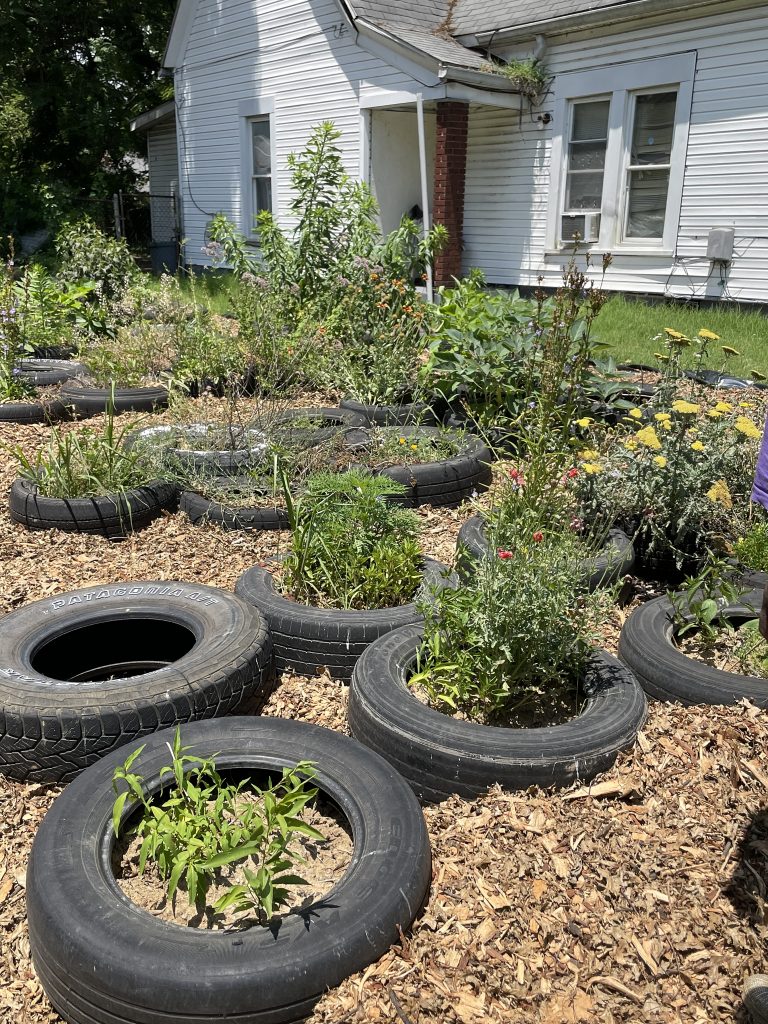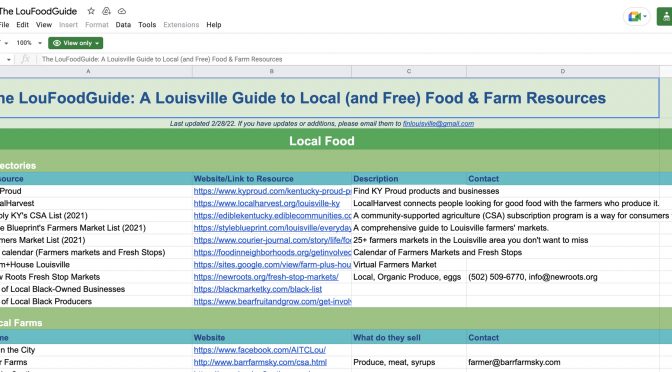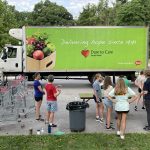By Robin Garr
LouisvilleHotBytes.com
I’ve liked food for a long time. Coming of age in the time of Julia Child and James Beard and culinary stars like that, it didn’t take me long as a young adult to get interested in cooking and dining out.
But a funny thing happened on the way to the restaurant critic’s mic: The more interested I became in food and cooking, the more I wanted to learn about food. Where does it come from? How does it grow? How is it distributed? And maybe most of all, why is it that some people on this green Earth have so much food that they can throw it away, while others might want to fight for those scraps?
In other words – and these are words that I’ll share with anyone who asks about food and drink – I believe that anyone who really wants to know food does best to learn not only about the culinary arts but also food distribution, hunger and poverty, and what needs to happen to get food on everybody’s plate.
Food justice: What it is
In short, I came to believe in food justice, the simple but important principle that everyone on Earth deserves access to nutritious, affordable, and culturally-appropriate food, and that those who work to get us our food, from the farm through processors, distributors to the grocery store, have a right to a living wage and and safety on the job.
I’ve tried to put my money where my mouth is. I covered the early days of the farm-to-table movement. When I left the downtown newspapers I did a quick pivot to work for a New York City-based nonprofit that worked in hunger and poverty (and published a book about that experience in 1995). I’ve stayed involved, supported farmers’ markets, and helped organize the big monthly food pantry at St. Matthew’s Episcopal Church in 2010. (It’s still going on, by the way. If you need food, show up and get a trunk load of groceries from Dare to Care at 9 a.m. every third Saturday. No ID needed, no questions asked.)
Am I bragging? No, not really, or not much anyway. All this is by way of explaining why I jumped up from my chair with a whoop when I ran across the LouFoodGuide: A Louisville Guide to Local (and Free) Food & Farm Resources, last month.
The LouFoodGuide: What it is
This Google Drive spreadsheet is a crowdsourced directory that serves as an aid to people who need food, people who want to help provide food, people who’d like to support a food-helping organization, and just anyone interested in food justice.
Its 96 entries (as of this writing) include directories of services, local farms, locally owned groceries, farm-to-fork catering companies, sources of emergency and free food, local food and agriculture organizations, national food and farmworker organizations, and other community resources. Every entry includes the organization’s name, website, phone and/or email, and brief description.
I loved this neat, comprehensive, and well-kept list, but I had so many questions! Who made it? Who is it for? A quick dive through an email address at the top of the page led me to Andrew Kang Bartlett, associate for national hunger concerns at the Presbyterian Hunger Program. Bartlett is involved with The Food In Neighborhoods Community Coalition (FIN), a 10-year-old community food policy council.
Food In Neighborhoods
What’s a FIN? Get ready for it. It needs a few words to spell out its mission: “FIN has been committed to creating a space where all have a voice in shaping a just and resilient food system, with special emphasis on perspectives, expressed needs, and solutions emerging from the neighborhoods that are most directly and negatively affected by the dominant food regime. FIN supports local efforts and initiates collaborative projects in urban agriculture, food and agricultural policy and advocacy, and food justice and food access in Louisville, Kentucky.”
Among other things, that includes the evolution of the LouFoodGuide that I found. The LouFoodGuide is intended to help anyone interested in these services to find food pantries and hot meals; find farmers and farmers’ markets, and find food advocacy organizations and other food-related community resources. Want to check it out? Here’s a shortened link: https://bit.ly/LouFoodGuide
I’m handing the mic to Bartlett to wrap this up with a little more background on FIN, its aims and intentions:
“FIN occupies a unique place in Louisville and bridges many essential parts of Louisville’s food system. FIN brings a justice and equity lens to food, which we consider a universal human right. …
“FIN is committed to creating a space where all voices are heard in shaping a just and resilient food system, with special emphasis on perspectives, expressed needs, and solutions emerging from the neighborhoods that are most directly and negatively affected by nutritional and food insecurity.“

How we can help
So how can you and I get involved? For starters, urban farmer Ariel Gartner at Fifth Element Farms, a pretty pollinator garden and greenhouse that grows foods for its South 26th Street neighbors, told me kindly but firmly: West Louisville’s new urban farmers don’t need well-off white folks from the East End coming down to tell them what to do. Fair enough.
But the organizations working for food equity and justice – see the LouFoodGuide for details – can use our donations and help. The FIN Website (foodinneighborhoods.org) offers more great resources and ways to get involved.
And if you see your local Metro Council rep at the grocery store? Collar them and tell them to be very cautious about the proposed West End Tax Increment Financing (TIF) plan. A lot of West End residents remain unenthusiastic about another big project from outside. And while you’re at it, ask them to do a rethink on weed-control ordinances that make it difficult for urban farmers to grow food and pollinator flowers on their city lots.




